
Theoretical and Experimental Plant Physiology
metrics 2024
Connecting Research and Practice in Plant Physiology
Introduction
Theoretical and Experimental Plant Physiology, published by the Brazilian Society of Plant Physiology, is a leading academic journal dedicated to advancing the field of plant physiology through rigorous theoretical and empirical research. With an ISSN of 2197-0025, this journal has carved a niche within the scientific community, operating out of the prestigious Department of Plant Physiology at UNICAMP, Brazil. Since its inception in 2014, it has continuously provided a platform for high-quality research, achieving a notable impact factor that positions it in the Q2 quartile for both Agronomy and Crop Science and Plant Science categories as of 2023. Moreover, it boasts impressive Scopus rankings, with a percentile ranking of 69th in Plant Science and 68th in Agronomy. The journal embraces open-access principles, making its scholarly content accessible to researchers, professionals, and students dedicated to uncovering the complexities of plant physiology. By publishing innovative studies and critical reviews, it strives to foster a deeper understanding of plant functions and responses, thus contributing significantly to agriculture, biotechnology, and environmental sustainability.
Metrics 2024
 0.53
0.53 2.20
2.20 2.30
2.30 25
25Metrics History
Rank 2024
Scopus
IF (Web Of Science)
JCI (Web Of Science)
Quartile History
Similar Journals

PHOTOSYNTHETICA
Transforming insights into impactful plant science.PHOTOSYNTHETICA is a prominent academic journal published by the Academy of Sciences of the Czech Republic, Institute of Experimental Botany, dedicated to advancing the field of plant science and physiology. Established in 1979, this open-access journal has been a vital platform for high-quality research and critical discussions within the scientific community, with its current impact factor reflecting its significance—ranking in the third quartile in Physiology and the second quartile in Plant Science as of 2023. With an impressive Scopus ranking (#96/516) in Plant Science and an 81st percentile standing, PHOTOSYNTHETICA showcases innovative research trends and methodologies vital for understanding photosynthetic processes and plant biology. The journal's open-access policy, initiated in 2019, ensures that valuable findings are readily available to researchers, professionals, and students globally, fostering collaboration and knowledge exchange. Set in the heart of Europe, this journal continues to be a cornerstone for experts dedicated to exploring the complexities of plant systems and their physiological responses.
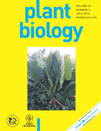
PLANT BIOLOGY
Nurturing Insights into Ecological SignificancePLANT BIOLOGY is a prestigious academic journal published by Wiley, dedicated to advancing knowledge in the fields of plant science, ecology, and evolutionary biology. With an impressive impact factor and ranking in the Q1 category for Ecology, Evolution, Behavior and Systematics, and Plant Science as of 2023, it stands at the forefront of research dissemination. The journal encompasses a broad scope of plant biology topics, providing a critical platform for researchers to share innovative findings and foster interdisciplinary collaboration. Available in both print (ISSN: 1435-8603) and online formats (E-ISSN: 1438-8677), it ensures accessibility through open access options. As a crucial resource for professionals, researchers, and students alike, PLANT BIOLOGY cultivates a deeper understanding of plant systems and their ecological significance, making it an essential addition to the library of anyone dedicated to the study of biology and the environment.
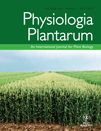
PHYSIOLOGIA PLANTARUM
Advancing Plant Science Through Innovative ResearchPHYSIOLOGIA PLANTARUM, published by WILEY, is a prestigious journal in the fields of plant science, physiology, and genetics, known for its impactful contributions since its inception in 1948. With an impressive impact factor and a consistent ranking in the Q1 and Q2 quartiles, it stands out in critical disciplines such as cell biology and biochemistry, ranking #24 in Plant Science with a remarkable 95th percentile standing. This journal primarily serves researchers and professionals committed to advancing the understanding of plant functions, responses, and their molecular mechanisms. Its broad scope allows for a diverse array of studies, ensuring that groundbreaking research is accessible to the global scientific community. Although it does not offer Open Access, PHYSIOLOGIA PLANTARUM remains a vital resource for scholars looking to stay at the forefront of plant biology and related fields.
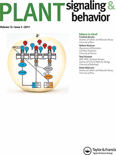
Plant Signaling & Behavior
Unlocking the Secrets of Plant CommunicationPlant Signaling & Behavior is a prestigious journal published by TAYLOR & FRANCIS INC, dedicated to advancing the understanding of the complex signaling mechanisms and behavioral responses of plants. With an ISSN of 1559-2316 and an E-ISSN of 1559-2324, it has firmly established itself in the field of Plant Science, earning a Q1 ranking in the 2023 category quartiles and ranking #83 out of 516 in Agricultural and Biological Sciences, placing it in the 84th percentile according to Scopus metrics. The journal serves as a vital platform for researchers and professionals looking to publish innovative studies and reviews that explore the intricate relationships between plant behavior and environmental signaling. With coverage spanning from 2006 to 2024, Plant Signaling & Behavior not only enhances academic discourse but also supports the growing interdisciplinary nature of plant sciences. Although the journal is not open access, it remains a significant resource for students, researchers, and practitioners aiming to deepen their understanding of plant signaling and its implications for ecology and agricultural practices.
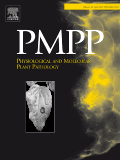
PHYSIOLOGICAL AND MOLECULAR PLANT PATHOLOGY
Innovating solutions for a sustainable agricultural future.Physiological and Molecular Plant Pathology is a leading journal published by Academic Press Ltd - Elsevier Science Ltd, dedicated to advancing our understanding of plant diseases through the synthesis of physiological and molecular perspectives. With an ISSN of 0885-5765, this esteemed journal has been a cornerstone in the field since its inception in 1986 and continues to publish critical research findings up to 2024. Notably, it holds a strong reputation in Plant Science, ranked Q2, and genetics, ranked Q3, reflecting its impactful contributions to these important areas of study. The journal is recognized within Scopus, achieving a ranking of 151 out of 516 in Plant Science, positioning it within the 70th percentile, making it a vital resource for researchers and students alike. While it is not an open-access journal, the insights provided in each issue are invaluable for those dedicated to understanding the complexities of plant pathology and enhancing agricultural resilience. Researchers, professionals, and students in the field are encouraged to explore and contribute to this pivotal journal, which plays a crucial role in driving innovation and discovery in plant health sciences.

JOURNAL OF PLANT BIOCHEMISTRY AND BIOTECHNOLOGY
Leading the Charge in Plant Biotechnology AdvancementsJOURNAL OF PLANT BIOCHEMISTRY AND BIOTECHNOLOGY, published by SPRINGER INDIA, is a leading publication dedicated to advancing research in the fields of plant biochemistry, biotechnology, agronomy, and crop science. With an ISSN of 0971-7811 and E-ISSN 0974-1275, the journal encompasses a wide range of studies aimed at enhancing our understanding of plant biological processes and their applications in agriculture and biotechnology. It has achieved a noteworthy Q2 ranking in Agronomy and Crop Science and Plant Science, as well as a Q3 ranking in Biotechnology, reflecting its quality and relevance in contemporary research. Notably, the journal ranks #166 in Plant Science and #133 in Agronomy, both falling in the top 67th percentile. With a rich history spanning from 1992 to 2024, the journal is committed to providing open access to innovative research findings that bridge the gap between laboratory discoveries and their practical applications in sustainable agriculture. Researchers, professionals, and students will find a wealth of knowledge and inspiration to advance their work in the dynamic field of plant sciences at this esteemed journal.

Journal of Integrative Plant Biology
Innovative Research, Global ImpactThe Journal of Integrative Plant Biology, published by WILEY, is a premier academic journal that has been at the forefront of advancing research in plant biology since its inception in 2005. With a notable impact factor and a robust Scopus ranking—positioned at #7 out of 516 in Plant Science and #18 out of 438 in Biochemistry—this journal is recognized as a Q1 journal in multiple categories, including Biochemistry and Plant Science. The journal aims to bridge the gaps between various disciplines in plant research, emphasizing integrative and interdisciplinary approaches to understanding plant biology. With options for open access, the Journal of Integrative Plant Biology ensures broad visibility and impact of research findings, making it an invaluable resource for researchers, professionals, and students looking to stay informed on innovative advancements in the field. Its headquarters are located in the United Kingdom, further amplifying its reach within the global academic community.
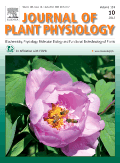
JOURNAL OF PLANT PHYSIOLOGY
Connecting Knowledge to CultivationJOURNAL OF PLANT PHYSIOLOGY, published by ELSEVIER GMBH, stands as a leading international journal dedicated to the field of plant physiology, agronomy, and crop science. With an impressive impact factor and recognition within the Q1 and Q2 quartiles across various categories, this journal consistently ranks among the top in its field—positioned at #65/516 in Plant Science and #52/406 in Agronomy and Crop Science as of 2023. Located in Munich, Germany, it serves as a vital platform for researchers, practitioners, and students to share groundbreaking insights and advancements. Although it does not currently offer open access, the journal provides an essential repository of knowledge, publishing significant original research, reviews, and discussions on plant function, regulation, and development, thereby shaping the future of agricultural practices and contributing to our understanding of biophysical processes. Researchers looking to publish in a reputable venue or to access cutting-edge studies will find JOURNAL OF PLANT PHYSIOLOGY an invaluable resource.
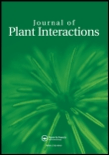
Journal of Plant Interactions
Cultivating Research on Plant Behavior and EcologyThe Journal of Plant Interactions, published by Taylor & Francis Ltd in the United Kingdom, serves as a leading open-access platform dedicated to advancing the understanding of plant interactions and their ecological implications. Established in 2005 and transitioning to open access in 2015, this journal focuses on both fundamental and applied aspects of plant interactions, providing invaluable insights for researchers, professionals, and students within the fields of Ecology and Plant Science. With a commendable impact factor and ranked in the second quartile (Q2) for both Ecology, Evolution, Behavior and Systematics and Plant Science, it reflects the quality and relevance of its published research. Researchers aiming to publish innovative studies on plant behavior and ecosystem dynamics will find a welcoming avenue for their work, as the journal is dedicated to fostering open dialogue and sharing knowledge across disciplines.

PROTOPLASMA
Pioneering Research that Shapes Biological UnderstandingPROTOPLASMA is a prestigious academic journal published by Springer Wien, dedicated to advancing knowledge in the fields of Cell Biology, Plant Science, and related areas of Medicine. Established in 1926 and continuing through 2024, this journal boasts a rich history of scholarly contributions and is currently indexed with a notable ranking in various disciplines: it stands in the top quartile (Q1) in Plant Science, the second quartile (Q2) in miscellaneous Medicine, and the third quartile (Q3) in Cell Biology as of 2023. With robust Scopus rankings placing it in the 86th percentile in Plant Science and a solid position in Cell Biology, PROTOPLASMA is recognized for its commitment to high-quality research and innovative findings. Although the journal does not offer open access options, it remains a valuable resource for researchers, professionals, and students seeking to explore the cellular and molecular underpinnings of plant life and its implications in broader biological contexts. Based in Austria, PROTOPLASMA serves as a vital forum for disseminating pioneering research that shapes the future of scientific inquiry in its respective fields.